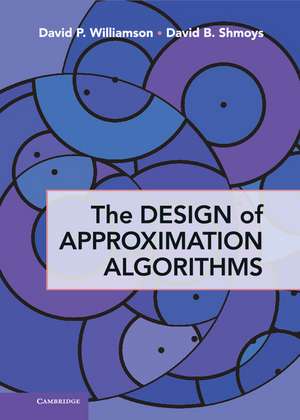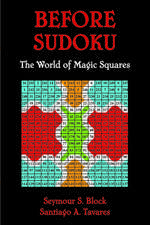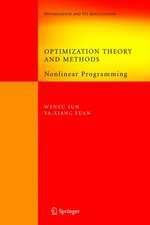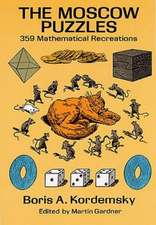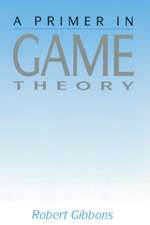The Design of Approximation Algorithms
Autor David P. Williamson, David B. Shmoysen Limba Engleză Hardback – 25 apr 2011
Preț: 471.00 lei
Preț vechi: 529.21 lei
-11% Nou
Puncte Express: 707
Preț estimativ în valută:
90.14€ • 97.88$ • 75.71£
90.14€ • 97.88$ • 75.71£
Carte tipărită la comandă
Livrare economică 22 aprilie-06 mai
Preluare comenzi: 021 569.72.76
Specificații
ISBN-13: 9780521195270
ISBN-10: 0521195276
Pagini: 518
Ilustrații: 86 b/w illus. 121 exercises
Dimensiuni: 189 x 262 x 34 mm
Greutate: 1.12 kg
Ediția:New.
Editura: Cambridge University Press
Colecția Cambridge University Press
Locul publicării:New York, United States
ISBN-10: 0521195276
Pagini: 518
Ilustrații: 86 b/w illus. 121 exercises
Dimensiuni: 189 x 262 x 34 mm
Greutate: 1.12 kg
Ediția:New.
Editura: Cambridge University Press
Colecția Cambridge University Press
Locul publicării:New York, United States
Cuprins
Part I. An Introduction to the Techniques: 1. An introduction to approximation algorithms; 2. Greedy algorithms and local search; 3. Rounding data and dynamic programming; 4. Deterministic rounding of linear programs; 5. Random sampling and randomized rounding of linear programs; 6. Randomized rounding of semidefinite programs; 7. The primal-dual method; 8. Cuts and metrics; Part II. Further Uses of the Techniques: 9. Further uses of greedy and local search algorithms; 10. Further uses of rounding data and dynamic programming; 11. Further uses of deterministic rounding of linear programs; 12. Further uses of random sampling and randomized rounding of linear programs; 13. Further uses of randomized rounding of semidefinite programs; 14. Further uses of the primal-dual method; 15. Further uses of cuts and metrics; 16. Techniques in proving the hardness of approximation; 17. Open problems; Appendix A. Linear programming; Appendix B. NP-completeness.
Recenzii
"This is a beautifully written book that will bring anyone who reads it to the current frontiers of research in approximation algorithms. It covers everything from the classics to the latest, most exciting results such as ARV’s sparsest cut algorithm, and does so in an extraordinarily clear, rigorous and intuitive manner."
Anna Karlin, University of Washington
"The authors of this book are leading experts in the area of approximation algorithms. They do a wonderful job in providing clear and unified explanations of subjects ranging from basic and fundamental algorithmic design techniques to advanced results in the forefront of current research. This book will be very valuable to students and researchers alike."
Uriel Feige, Professor of Computer Science and Applied Mathematics, the Weizmann Institute
"Theory of approximation algorithms is one of the most exciting areas in theoretical computer science and operations research. This book, written by two leading researchers, systematically covers all the important ideas needed to design effective approximation algorithms. The description is lucid, extensive and up-to-date. This will become a standard textbook in this area for graduate students and researchers."
Toshihide Ibaraki, The Kyoto College of Graduate Studies for Informatics
"This book on approximation algorithms is a beautiful example of an ideal textbook. It gives a concise treatment of the major techniques, results and references in approximation algorithms and provides an extensive and systematic coverage of this topic up to the frontier of current research. It will become a standard textbook and reference for graduate students, teachers and researchers in the field."
Rolf H. Möhring, Technische Universität Berlin
"I have fond memories of learning approximation algorithms from an embryonic version of this book. The reader can expect a clearly written and thorough tour of all the important paradigms for designing efficient heuristics with provable performance guarantees for combinatorial optimization problems."
Tim Roughgarden, Stanford University
"This book is very well written. It could serve as a textbook on the design of approximation algorithms for discrete optimization problems. Readers will enjoy the clear and precise explanation of modern concepts, and the results obtained in this very elegant theory. Solving the exercises will benefit all readers interested in gaining a deeper understanding of the methods and results in the approximate algorithms for discrete optimization area."
Alexander Kreinin, Computing Reviews
"Any researcher interested in approximation algorithms would benefit greatly from this new book by Williamson and Schmoys. It is an ideal starting point for the fresh graduate student, as well as an excellent reference for the experts in the field. The wrting style is very clear and lucid, and it was a pleasure reading and reviewing this book."
Deeparnab Chakrabarty for SIGACT News
"The structure of the book is very interesting and allows a deeper understanding of the techniques presented. The whole book manages to develop a way of analyzing approximation algorithms and of designing approximation algorithms that perform well."
Dana Simian, Mathematical Reviews
Anna Karlin, University of Washington
"The authors of this book are leading experts in the area of approximation algorithms. They do a wonderful job in providing clear and unified explanations of subjects ranging from basic and fundamental algorithmic design techniques to advanced results in the forefront of current research. This book will be very valuable to students and researchers alike."
Uriel Feige, Professor of Computer Science and Applied Mathematics, the Weizmann Institute
"Theory of approximation algorithms is one of the most exciting areas in theoretical computer science and operations research. This book, written by two leading researchers, systematically covers all the important ideas needed to design effective approximation algorithms. The description is lucid, extensive and up-to-date. This will become a standard textbook in this area for graduate students and researchers."
Toshihide Ibaraki, The Kyoto College of Graduate Studies for Informatics
"This book on approximation algorithms is a beautiful example of an ideal textbook. It gives a concise treatment of the major techniques, results and references in approximation algorithms and provides an extensive and systematic coverage of this topic up to the frontier of current research. It will become a standard textbook and reference for graduate students, teachers and researchers in the field."
Rolf H. Möhring, Technische Universität Berlin
"I have fond memories of learning approximation algorithms from an embryonic version of this book. The reader can expect a clearly written and thorough tour of all the important paradigms for designing efficient heuristics with provable performance guarantees for combinatorial optimization problems."
Tim Roughgarden, Stanford University
"This book is very well written. It could serve as a textbook on the design of approximation algorithms for discrete optimization problems. Readers will enjoy the clear and precise explanation of modern concepts, and the results obtained in this very elegant theory. Solving the exercises will benefit all readers interested in gaining a deeper understanding of the methods and results in the approximate algorithms for discrete optimization area."
Alexander Kreinin, Computing Reviews
"Any researcher interested in approximation algorithms would benefit greatly from this new book by Williamson and Schmoys. It is an ideal starting point for the fresh graduate student, as well as an excellent reference for the experts in the field. The wrting style is very clear and lucid, and it was a pleasure reading and reviewing this book."
Deeparnab Chakrabarty for SIGACT News
"The structure of the book is very interesting and allows a deeper understanding of the techniques presented. The whole book manages to develop a way of analyzing approximation algorithms and of designing approximation algorithms that perform well."
Dana Simian, Mathematical Reviews
Notă biografică
Descriere
Designed as a textbook for graduate courses on algorithms, this book presents efficient algorithms that find provably near-optimal solutions.
